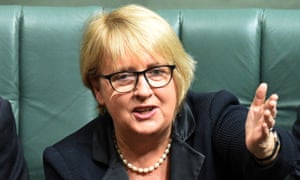The retiring ALP stalwart reflects on her party’s turbulent past, overcoming disappointment and ministerial achievements
• Jenny Macklin on 23 years as a Labor MP – Australian politics live podcast
• Jenny Macklin on 23 years as a Labor MP – Australian politics live podcast
Jenny
Macklin wants to talk about time. Time to serve in public life, time to
move on from it and contemplate another contribution. Time to think.
Time to make the sort of policy that changes lives. And time to endure
the inevitable disappointments – and forgive.
Given how fast time moves in politics now, given the relentlessness of everything, it is possible to forget that Macklin was the first Australian woman to be appointed deputy leader of a major Australian political party.
The member for Jagajaga served with Simon Crean, then Mark Latham and finally Kim Beazley, before Kevin Rudd and Julia Gillard rolled over the top of the Beazley-Macklin leadership team in 2006.
The Rudd-Gillard juggernaut denied Macklin her chance of being deputy prime minister in a Labor government just as the ALP was emerging from the long slog of opposition during the Howard years. The setback was hard, too, because Macklin modelled herself as a parliamentarian on her mentor Brian Howe, who served Bob Hawke and Paul Keating as deputy prime minister in the 1990s.

Given how fast time moves in politics now, given the relentlessness of everything, it is possible to forget that Macklin was the first Australian woman to be appointed deputy leader of a major Australian political party.
The member for Jagajaga served with Simon Crean, then Mark Latham and finally Kim Beazley, before Kevin Rudd and Julia Gillard rolled over the top of the Beazley-Macklin leadership team in 2006.
The Rudd-Gillard juggernaut denied Macklin her chance of being deputy prime minister in a Labor government just as the ALP was emerging from the long slog of opposition during the Howard years. The setback was hard, too, because Macklin modelled herself as a parliamentarian on her mentor Brian Howe, who served Bob Hawke and Paul Keating as deputy prime minister in the 1990s.

Given Australian voters have been subjected in recent years to wronged political leaders who can’t seem to cope with reversals of fortune, who reprosecute old wars in public and lick their wounds on live television, it pays to point out that not all politicians are like that.
“But once I got over the immediate upset, the thing that really convinced me to deal with it was I’ve seen a lot of people, not just politicians, who have a hard knock and then get very bitter.
“I really didn’t want to be that sort of person. I thought if I am going to stay in politics, I have to just get over it. If I want to be a minister in a government led by Kevin and Julia, then I have to get on with them.”
Macklin put herself back together and set about making her peace with Gillard – her long-time colleague from the Victorian left. “I thought, ‘I have to resolve this. I have to go to her and talk to her about it’. I did and we resolved it.”
"If you’ve got big things you want to do, you can’t be changing ministers every 10 minutes"
How did that conversation play out? “I said, ‘I’ll work with you, I want to work with you’, and she said, ‘Thank you’.”
That simple? “I think she was surprised, to be honest, but it was a really good thing for both of us – she was generous and I was as well, and I think we became a very effective partnership.”
Macklin has not told the story of rapprochement with Gillard before, but now wants it on the record, a modest homily about resilience.
The two women patched up their relationship from that point and Macklin prospered in the engine room of that government, one of the few senior players able to work with both Rudd and Gillard as their relationship fell into dysfunction and keep the policy agenda on the rails.

The Victorian leftwinger has been, without question, one of the most influential figures in Labor politics for the last two decades, but she has never cultivated a big public profile. Macklin says this is partly due to her personality. Despite her long tenure in public life, she is a shy person. And, she says, in politics it is critically important to be yourself.
But our conversation returns to time. It’s finite.
In government, senior cabinet ministers are so busy they can barely scratch themselves. If you want to change the country, you have to create the space to think, and the opportunity cost of that thinking might end up being time spent in front of a television camera, building a brand.
"I don’t want people to be afraid of big reform just because implementation is hard"
Policy, at least the sort of policy that Macklin has pursued during the span of her working life, needs time. Progress is not instant. Ideas have long gestation periods. Two of the reforms she championed in government – paid parental leave and the national disability insurance scheme – took years to design and implement.
Achieving paid parental leave took more than a decade. The NDIS had its origins in the Whitlam years.
Policy requires time to get the technical details right, time to consult, time to lobby colleagues, particularly prime ministers and treasurers, time to build a constituency outside the parliament.
It also requires continuity, Macklin says. “I think it was helpful that I was the minister all the way through. I think that’s an important thing for a future government to think about.
“If you’ve got big things you want to do, you can’t be changing ministers every 10 minutes. Some of these things require a lot of detailed work.”
Implementation is also difficult. She acknowledges the current problems with the rollout of the NDIS. “Implementation of this shift is enormously difficult. It’s a massive change in so many ways – so yes, it’s hard.”
Macklin wants the next generation of progressive parliamentarians – a group she rates highly – not to be dissuaded by the degrees of difficulty and paralysed by risk aversion.

“I don’t want people to be afraid of big reform just because implementation is hard,” she says. “You have to be determined, stick at it and deal with the problems as they arise. Big reform is worth it when you see the change it makes for individuals’ lives.”
You can also make mistakes, the member for Jagajaga says. The Northern Territory intervention, which John Howard spearheaded in 2007 with Labor’s support, was one such mistake.
Macklin says the intervention did allow services to be delivered and some people’s lives improved as a result, “but the message loud and clear from Aboriginal people is, ‘unless we are in charge it’s not going to work’.”
She says the consequences of the intervention are still reverberating today. “It’s reverberating through the Uluru statement. People want a voice and they want it in the constitution so they have a constitutional right to their voice.”
Macklin says the intervention was a mistake “because it was so offensive and it hurt so many people”.
“I would never have done it that way,” she says. “We would never have suspended the Racial Discrimination Act. It shouldn’t have happened. It was wrong. The government shouldn’t have gone in over the top of Aboriginal people. It shouldn’t have happened. It wasn’t effective as a result.”

No comments:
Post a Comment